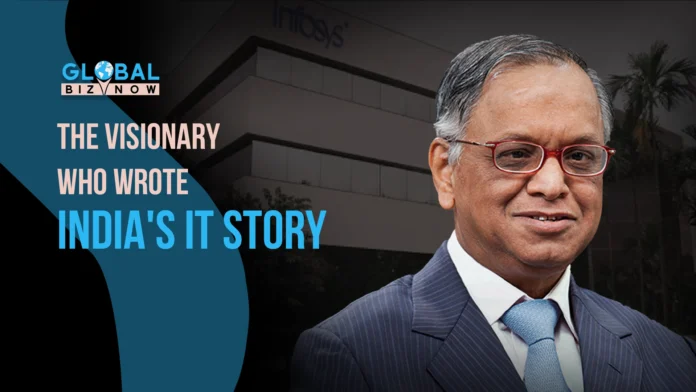Narayana Murthy‘s journey is a testament to the power of determination, creativity, and persistence. His story not only chronicles the rise of one of the most influential figures in global Information Technology but also illustrates the profound impact of visionary leadership on an entire industry.
Murthy’s Initial Years
Born on August 20, 1946, in Kolar, Karnataka, India, Narayana Murthy began his academic journey with a bachelor’s degree in electrical engineering from the University of Mysore. His thirst for knowledge led him to pursue a master’s degree in technology from the prestigious Indian Institute of Technology, Kanpur. These formative years laid the foundation for his future endeavors.
Exploring New Horizons
After completing his education, Murthy ventured to Paris, where he worked on designing an operating system for air cargo management at Charles de Gaulle Airport. This international experience not only broadened his horizons but also fueled his entrepreneurial ambitions, sparking the innovative spirit that would later define his career.
Facing Entrepreneurial Challenges
In the mid-1970s, Murthy returned to India and embarked on his first entrepreneurial venture by founding Softronics, an IT company. Despite his passion and efforts, the company faced significant challenges and folded within a year and a half. Undeterred by this setback, Murthy joined Patni Computer Systems in Pune, where he further honed his skills in the IT domain.
The Birth of a Tech Giant
In 1981, with a modest loan from his spouse, Sudha Murthy, Narayana Murthy, along with six visionary colleagues, founded Infosys. What started in a small apartment in Pune soon grew into a technological giant. The early years were fraught with challenges, including limited resources and fierce competition. However, the winds of change brought by India’s economic liberalization in the early 1990s breathed new life into Infosys, propelling it to global eminence and revolutionizing the outsourcing landscape.
Reaching New Heights
Under Murthy’s leadership, Infosys reached unprecedented heights, becoming a leader in the Indian IT sector. A significant milestone came in 1999 when Infosys became the first Indian company to be listed on Nasdaq. By the fiscal year 2020-21, the company’s revenues had soared to $14 billion, cementing its position as a global powerhouse.
A Revered Legacy
Narayana Murthy’s visionary leadership earned him the prestigious title of “Father of the Indian IT sector.” He is globally recognized for his contributions and has been honored with accolades such as the Padma Shri and Padma Vibhushan, symbolizing his profound impact on the industry’s evolution.
Lasting Influence and Reflections
Narayana Murthy’s story serves as an inspiration, showcasing how innovation, perseverance, and ethical leadership can transform not only a single enterprise but an entire industry. His indelible mark continues to ignite the entrepreneurial spirit worldwide.
Murthy’s reflections on India’s high-tech industry and globalization offer deep insights into his thought process:
Historical Roots: He credits India’s high-tech industry roots to Jawaharlal Nehru’s focus on education and foreign exchange for students, envisioning engineers and scientists as architects of modern India.
Socialism and Wealth Creation: While initially embracing Nehru’s socialism, Murthy later recognized its limitations and the need for wealth creation to drive progress.
Infosys’s Vision: Infosys began with seven people and $250, with a vision for global competitiveness and strong corporate governance.
Global Markets and Liberalization: India’s liberalization in 1991 reduced business barriers, allowing Infosys to thrive in global markets. Today, 98% of Infosys’s revenue comes from international clients.
Employee-Centric Approach: Infosys values its employees, offering attractive stock options and flexible working conditions, recognizing them as the company’s most significant assets.
Advocacy for Globalization: Murthy advocates for globalization as a means of poverty alleviation but stresses the importance of fair trade practices and compassionate capitalism.
Corporate Responsibility: He believes corporations should prioritize societal welfare to ensure long-term success, emphasizing the importance of adhering to global trade principles for equitable outcomes.
Hope for Capitalism with Compassion: Murthy expresses hope that capitalism, coupled with compassion and social responsibility, can garner broader support and lead to more equitable development.
Concern for India and Social Impact
Beyond his corporate achievements, Narayana Murthy has always been deeply concerned about the future of India. He believes that the success of the IT sector should translate into broader societal benefits, particularly in education, healthcare, and rural development.
Murthy has been a strong advocate for improving India’s education system, seeing it as the bedrock for the country’s future. His philanthropic efforts, often in partnership with his wife, Sudha Murthy, have funded numerous educational initiatives across India, particularly in rural areas.
Murthy’s commitment to ethical leadership is evident in his stance against corruption and his advocacy for good governance. He has urged Indian companies to play a proactive role in addressing social issues, arguing that businesses should contribute to the broader community rather than focusing solely on profits.
His deep concern for India’s social and economic progress adds another dimension to his legacy, making him not just a business icon but also a champion of national development. His legacy continues to shape the global IT landscape and serves as a beacon of hope for those who dare to dream big.
Keep Reading More Articles Like This: Click Here.



